- Home
- Jim Butcher
Princeps Fury ca-5 Page 4
Princeps Fury ca-5 Read online
Page 4
“Yes, Your Highness,” Magnus said.
Tavi stared down at the map, shaking his head slowly. “And we never knew?”
“The Canim have guarded their coastline quite jealously over the centuries,” Magnus said. “Fewer than a dozen Aleran ships have ever visited their shores-and those have only been allowed to dock at a single port, a place by the name of Marshag. No Aleran has ever been permitted off the docks-and returned to tell about it, at any rate.”
Tavi shook his head. “What about furycrafting? Have we never sent Knights Aeris to overfly it?”
“The range of any flyer is limited. A Knight Aeris could fly perhaps two or three hundred miles and back, but he could hardly expect to do so unobserved-and as we saw subsequent to the Night of the Red Stars, the Canim do possess the ability to counter our flyers.” Magnus shrugged, and smiled faintly. “Then, too, it has been speculated that our furycrafting abilities would be significantly reduced, so far from Alera, and our furies’ points of origin. It is possible that a Knight Aeris would not be able to fly at all.”
“But no one’s ever thought to test it?” Tavi asked.
“The ships that have sailed there have all been couriers and merchantmen.” Magnus flashed Tavi a swift smile. “Besides, can you imagine the Citizen who would want to rush off to the domain of the Canim amidst a crowd of rude sailors, only to find out that he is just as powerless as they?”
Tavi shook his head slowly. “I suppose not.” He tapped a finger on the maps. “Could this be a lie? Deliberately planted for us to find?”
“Possible,” Magnus said, approval in his tone, “though I would consider it a very low order of probability.”
Tavi grunted. “Well,” he said. “This is rather valuable information.”
“I thought it so,” Magnus said.
Tavi sighed. “I suppose I won’t have you thrown off the ship just yet.”
“I appreciate that, Your Highness,” Magnus said gravely.
Tavi traced his finger over several heavy lines, many of which ran ruler-straight. “These lines. Canals of some sort?”
“No, Your Highness,” Magnus said. “Those are boundary lines between territories.”
Tavi looked up blankly at Magnus. “I don’t understand.”
“Apparently,” Magnus said, “the Canim do not exist as a single governmental body. They are divided into several separate, distinct organizations.”
Tavi frowned. “Like the Marat tribes?”
“Not exactly. Each territory is entirely independent. There is no overriding unity, no centralized leadership. Each is governed completely separately from all the others.”
Tavi blinked. “That’s…” He frowned. “I was going to say that it was insane.”
“Mmmm,” Magnus said. “Because Carna is a savage world, packed with far too many different peoples, most of them in constant conflict with one another. For us Alerans, only a united stand against our foes has allowed us to survive and prosper.”
Tavi gestured at the map. “Whereas the Canim have numbers enough that they can afford to be divided.”
Magnus nodded. “All things considered, it makes me rather glad that our new Princeps found an honorable, peaceful, and respectful solution to the situation in the Vale.”
“Can’t hurt to make a good first impression,” Tavi agreed. He shook his head slowly. “Can you imagine, Magnus, what would have happened if those hotheaded idiots in the Senate had gotten their way and funded a full-scale retaliation upon the Canim homeland?”
Magnus shook his head in silence.
“With numbers like this,” Tavi continued, “they could have wiped us out. Furycrafting or no, they could have destroyed us at will.”
Magnus’s face turned grim. “So it would seem.”
Tavi looked up at him. “So why didn’t they?”
The old Cursor shook his head again. “I don’t know.”
Tavi studied the map for a time, examining the various territories. “Then Varg, I take it, is a member of only one of these territories?”
“Yes,” Magnus said. “Narash. It’s the only territory that has actually made contact with Alera.”
The territory of Narash, Tavi noted, was also home to the port of Marshag. “Then I suppose the next question we need to ask ourselves is-”
Outside the cabin, the ship’s bell began to ring frantically. Demos began bellowing orders. A few moments later, the captain himself knocked, then opened the cabin door.
“Magnus,” he said, nodding to the old Cursor. “My lord,” he said, nodding to Tavi. “The old sea dog was right. There’s a storm coming up on us from the south.”
Tavi winced, but nodded. “How can we help you, Captain?”
“Tie down anything that isn’t bolted to the floor,” Demos said, “including yourselves. It’s going to be a bad one.”
CHAPTER 2
Valiar Marcus debated the proper way to inform the proud young Canim officer that there was, in fact, a considerable distinction between telling an Aleran that he had a poor sense of smell and informing him that he smelled bad.
The young Cane, Marcus knew, was anxious to make a good showing in his language lessons in front of no less personages than both Varg, the undisputed commander of the Canim fleet, and his son and second-in-command, Nasaug. If Marcus made the young officer look foolish, it would be an insult that the Cane would carry stubbornly to his grave-and given the enormous life span of the wolf-folk, it meant that Marcus’s actions could cause repercussions, good or ill, for generations yet unborn.
“While your statement is doubtless accurate,” Marcus replied, in careful, slow, clearly pronounced Aleran, “you may find that many of my countrymen will respond awkwardly to such remarks. Our own sense of smell is, as you note, a great deal less developed than your own, and as such the use of language that bears upon it will carry a different degree of significance than it might amongst your own folk.”
Varg growled under his breath, and muttered, “Few, Aleran or Canim, care to be informed that their odor is unwelcome.”
Marcus turned his head to the grizzled old leader of the Canim and inclined his head, in the Aleran fashion. “As you say, sir.”
He had only a split second’s warning as the embarrassed young officer let out a snarl and lunged at Marcus, his jaws snapping.
Marcus had recognized the signs of brittle pride, which, it seemed, were as common and easily noted amongst ambitious young Canim as they were amongst their Aleran counterparts. Marcus was nearing sixty years of age, and would never have been fast enough to have met the Cane, had he been relying upon his senses alone to warn him-but foresight had always proven a far-more-effective defense than speed alone. Marcus had been anticipating the flash of temper and instant violence.
The Cane was eight feet of coiled steely muscle, fangs and hard bone, and weighed two or three of Marcus-but as his jaws darted forward, he was unable to twist away when Marcus seized his ear in one callused fist and hauled to one side.
The Cane twisted and rolled with the motion, letting out a snarl that rose to a high-pitched yelp of agony as he instinctively moved toward the source of the pull against his sensitive ear, to reduce the pressure on it. Marcus took advantage of the motion, breaking the Cane’s balance, building momentum, and dropped his entire weight as well as the young Cane’s full onto his furry chin, slamming him to the deck with a skull-jarring crack of impact.
The young Cane lay there stunned for a moment, his eyes glazed, his tongue hanging out of his mouth, bleeding from a small cut.
Marcus rose and straightened his tunic. “An inferior sense of smell,” Marcus said, as if absolutely nothing of significance had happened, “is distinct from being told that one smells unpleasant. It’s possible that someone sensitive might think you intended an insult. I personally am only an old centurion, too slow to be dangerous in a fight anymore, and find nothing insulting in either statement. I am not at all angry, and could do nothing about it even if I were upset.
But I would hate for someone less tolerant and more capable to do you harm when, clearly, you are only trying to be friendly. Do you understand me?”
The young officer stared at Marcus with glazed eyes. He blinked a few times. Then his ears twitched in a vague little motion of acknowledgment and assent.
“Good,” Marcus said, in his rough but functional Canish, smiling with only the slightest baring of his teeth. “I am glad that you make adequate progress in your efforts to understand Alerans.”
“A good lesson,” Varg growled in agreement. “Dismissed.”
The young Cane picked himself up, bared his throat respectfully to Varg and Nasaug, then walked rather unsteadily from the ship’s cabin.
Marcus turned to face Varg. The Cane was a giant of his race, nearly nine feet tall when standing, and the Trueblood had been built to fit him. The cabin, which, to the Cane, was as cramped as any shipboard space, was cavernous to Marcus. The Cane, a great black-furred creature, his coat marred with the white streaks of many scars, crouched on his haunches, the at-rest posture of his kind, negligently holding a thick, heavy scroll in his pawlike hands, open to the middle, where he had been reading during the language lesson.
“Marcus,” murmured Varg, his basso growl as threatening and familiar as it always was. “I expect you want an explanation for the attack.”
“You have a young officer who would be promising if he wasn’t an insufferably arrogant fool, convinced of the invincibility of your kind and, by extension, his own.”
Varg’s ears flicked back and forth in amusement. His eyes went to Nasaug-a Cane who was a shorter, brawnier version of his sire. Nasaug’s mouth dropped open, white fangs bared and tongue lolling in the Canim version of a smile.
“Told you,” Varg said, in Canish. “Huntmasters are huntmasters.”
“Sir?” Marcus asked. He understood the separate meanings of the words, but not their combined context.
“Senior warriors,” Nasaug clarified, to Marcus. “They are given command of groups of novices. Long ago, they would form hunting packs, and teach the young to hunt. The teacher was called the huntmaster.”
“These days,” Varg growled, “the word means one who trains groups of young soldiers and prepares them for their place in the order of battle. Your Legions have something like them as well.”
“Centurions,” Marcus said, nodding. “I see.”
“The pup would not have killed you,” Nasaug said.
Marcus faced the younger Cane squarely and calmly. “No, sir,” he replied, his voice steady. “He would not have. And out of respect for the Princeps’ desire for a peaceful journey, I did not kill him.”
“Why would you have done so, huntmaster?” growled Varg, his voice quietly dangerous.
Marcus turned back to face him without flinching. “Because I would far rather leave a dead fool behind me than a live enemy who has gained a measure of wisdom. In the future, I would take it as a courtesy if I was not used as an object lesson beyond those I have already been commanded to give.”
Varg bared his fangs in another Canim smile. “It is good to see that we understand one another. My boat is prepared to take you back to your ship, if you are ready, Valiar Marcus.”
“I am.”
Varg bowed his head and neck, Aleran-style. “Then go your way, and find good hunting.”
“And you, sir.”
Marcus had just turned to the door when it opened, and a lean Cane, reddish-furred and small for his kind, entered the cabin. Without preamble he bared his throat slightly to Varg and said, “A severe storm approaches, my lord. We have half of an hour or less.”
Varg took that in with a growl and dismissed the sailor with a jerk of his head. He glanced at Marcus. “No time to send you back and recover our boat,” he said. “It looks as though you’re staying for a time.”
“Sire,” growled Nasaug. There was a note of warning in his tone, Marcus thought. It was not difficult to guess at its source. Marcus had come to the immediate conclusion that he did not relish the notion of being effectively trapped within the hectic conditions of a ship under a storm with the angry young officer still smarting from his learning experience.
“The foremost cabin,” Varg said.
Nasaug’s tail lashed in a gesture that Marcus had come to recognize as one of surprise. The younger Cane quickly controlled himself and rose. “Centurion,” he rumbled, “if you would come with me. It would be best to have you out of the way so that the sailors may do their work. We will do our best to keep you comfortable.”
Marcus thought, with a dry amusement, that in this case comfortable was synonymous with breathing. But one learned rather quickly that the Canim had a viewpoint distinct from that of Alerans.
He followed Nasaug onto the Trueblood’s deck. Its timbers had all been painted black-something that would never have happened to an Aleran vessel. Quite the opposite, in fact. Ships were generally whitewashed. That made it easier for the crew to see what they were doing at night, particularly during bad weather, when few reliable light sources were to be had. All the black wood around them gave the ship a grim, funereal appearance, which was certainly imposing, particularly when combined with the black sails. A Cane’s night vision, though, was far superior to an Aleran’s. They likely had no trouble operating at night, whatever color the ship was tinted.
Nasaug led him to the foremost cabin on the ship-the one generally considered to be the least desirable, Marcus knew. On a sailing vessel, the wind generally blew in from the stern, and whoever was farthest downwind received the benefit of every unpleasant odor on board-and there were generally plenty to be had. The door to the cabin was low, barely Marcus’s own height, but rather than simply entering, Nasaug paused and knocked first-then waited for the door to be opened.
When it did, the cabin beyond was completely unlit, windowless and dark. A quiet voice asked, “May we serve, son of Varg?”
“This Aleran huntmaster is under Varg’s protection,” Nasaug said. “My sire bids you to safeguard him until he can be returned to his people after the storm.”
“It will be done,” the voice said. “He may enter, son of Varg.”
Marcus arched an eyebrow at that and glanced at Nasaug.
The Cane gestured toward the doorway with his snout. “Your quarters, centurion.”
Marcus glanced at the dark doorway, then at Nasaug. “I’ll be comfortable here, will I?”
Nasaug’s ears flicked in amusement. “More so than anywhere else on the ship.”
One of the critical things the Alerans had learned about dealing with the Canim, largely thanks to the Princeps himself, was that they placed a far higher priority on body language than humanity did. Words could be empty, and statements of motion and posture were considered to be a great deal more reliable and genuine indicators of intention. As a result, one did not display physical signs of fear before the predatory wolf-warriors, if one wanted to avoid being, for example, eaten.
So Marcus firmly clubbed down the instinctive apprehension the unseen speaker had awakened in him, nodded calmly to Nasaug, and stepped into the cabin, shutting the door behind him. In the darkened cabin, he became acutely aware of how thin his tunic and trousers were, and for the first time since the ships had left port, more than a month ago, he missed the constant burden of his armor. He did not put his hand to his sword-the gesture was too obvious. The knives he had concealed on his person would doubtless be of more use in any fight in such blackness, in any case. It would all happen in terrible proximity.
“You are no huntmaster,” said the unseen Cane after a moment. It let out a chuckling snarl. “No, no warrior.”
“I am a centurion of the First Aleran Legion,” he responded. “My name is Valiar Marcus.”
“Unlikely,” replied the voice. “It is more likely that you are called Valiar Marcus, I should judge.”
Marcus felt the tension sliding into his shoulders.
“We have been watching your spies, you know. They are larg
ely untrained. But we had no idea that you were one of them until only yesterday-and even that was the result of an accident. The wind parted a curtain, and you were seen reading one of Varg’s scrolls when he was out of the cabin.”
A second voice, this one to the right and higher up, spoke. “Only chance revealed you.”
A third voice, low and to his left, added, “The mark of an adept of the craft.”
Marcus narrowed his eyes in thought. “Varg didn’t bring in that pigheaded brat to use me to teach him a lesson,” he said. “He did it to delay my departure until the storm stranded me here.”
“At our request,” confirmed the first speaker.
Marcus grunted. But Varg had played the entire situation out as if it had been his usual planning intersecting with chance, all the way through. It meant that for whatever reason, Varg wanted to keep this conversation concealed, even from his own people. It implied dissension in the ranks-always useful information.
It also meant that his current hosts could only be one thing. “You’re Hunters,” he said quietly. “Like the ones who tried to assassinate the Princeps.”
There was the sound of soft motion in the dark, and then one of the Canim drew a heavy cloth away from a bowl filled with a liquid that cast off a glowing red light. Marcus could see the three Canim, lean, grey-furred members of the breed, with somewhat larger, more foxlike ears than most of the warriors he had seen. They were dressed in the loose robes patterned in grey and black that they had been described as wearing whenever they had been seen back in the Amaranth Vale.
The cabin was small, containing two bunk beds. One Cane crouched on the floor over the bowl. Another sprawled across the top bunk at one side of the room, while a third sat in an odd-looking crouch on the bottom bunk opposite. The three Canim were all but identical, down to the shade and patterning of their fur, marking them as family, probably brothers.
“Hunters,” said the first Cane. “So your folk have named us. I am called Sha.”

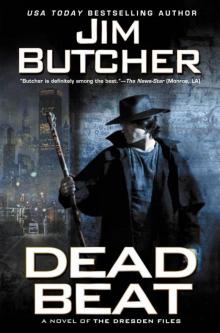 Dead Beat
Dead Beat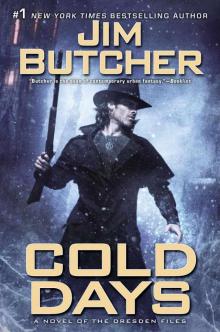 Cold Days
Cold Days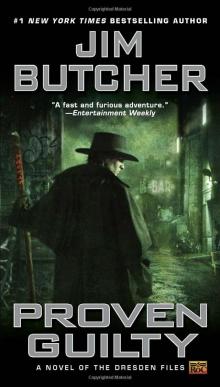 Proven Guilty
Proven Guilty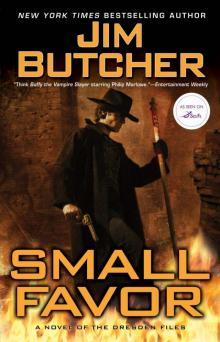 Small Favor
Small Favor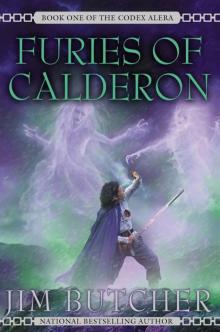 Furies of Calderon
Furies of Calderon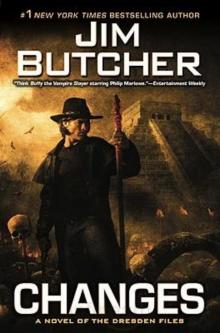 Changes
Changes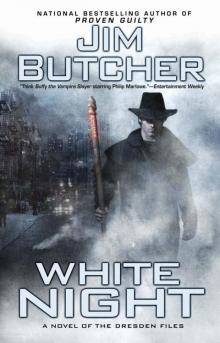 White Night
White Night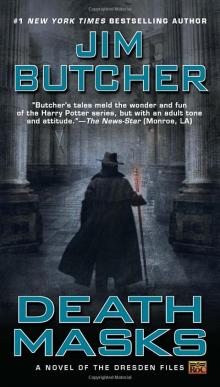 Death Masks
Death Masks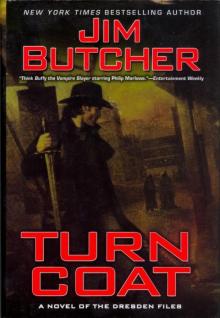 Turn Coat
Turn Coat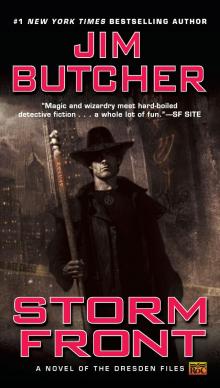 Storm Front
Storm Front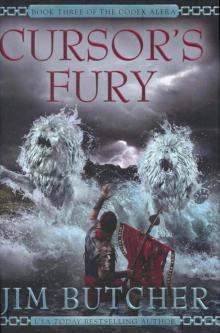 Cursor's Fury
Cursor's Fury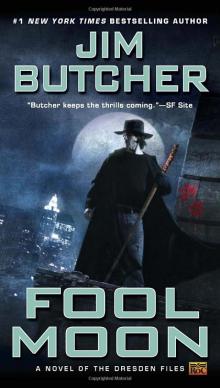 Fool Moon
Fool Moon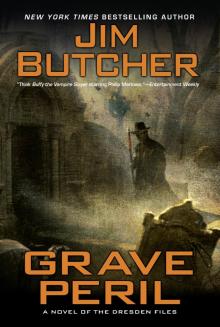 Grave Peril
Grave Peril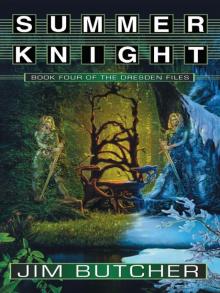 Summer Knight
Summer Knight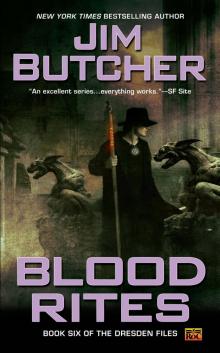 Blood Rites
Blood Rites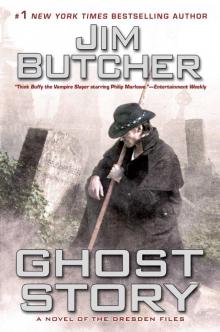 Ghost Story
Ghost Story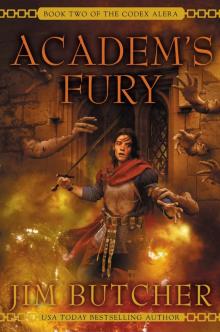 Academs Fury
Academs Fury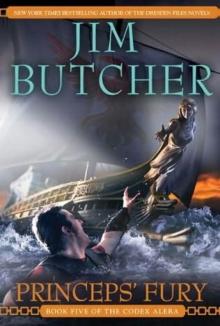 Princeps' Fury
Princeps' Fury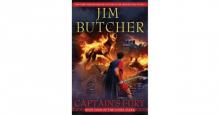 Captains Fury
Captains Fury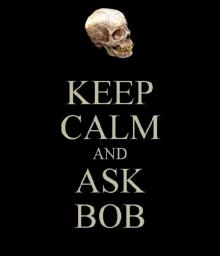 Jim Butcher - Dresden Files Omnibus
Jim Butcher - Dresden Files Omnibus Christmas Eve
Christmas Eve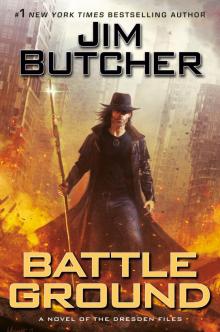 Battle Ground
Battle Ground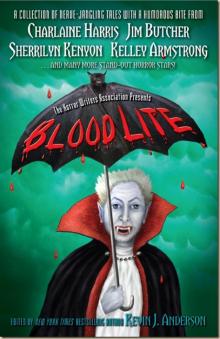 Blood Lite
Blood Lite Peace Talks
Peace Talks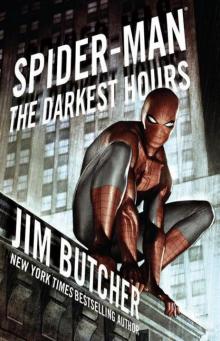 Spider-Man - The Darkest Hours
Spider-Man - The Darkest Hours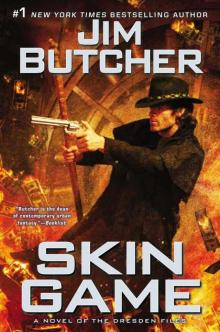 Skin Game
Skin Game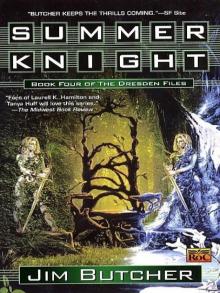 The Dresden Files 4: Summer Knight
The Dresden Files 4: Summer Knight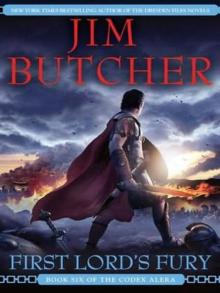 First Lord's Fury ca-6
First Lord's Fury ca-6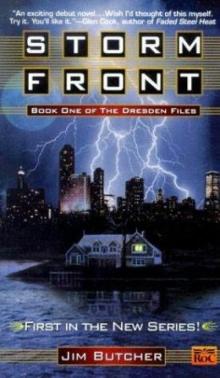 Storm Front df-1
Storm Front df-1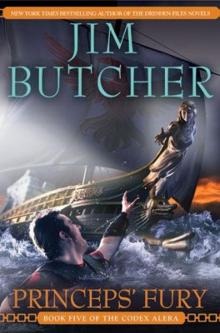 Princeps Fury ca-5
Princeps Fury ca-5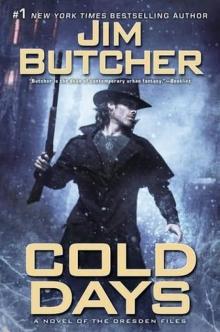 Cold Days df-14
Cold Days df-14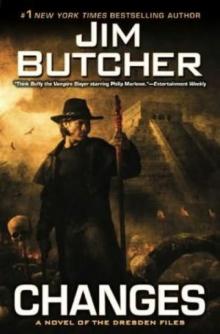 Changes df-12
Changes df-12 Urban Enemies
Urban Enemies Princeps' Fury (Codex Alera)
Princeps' Fury (Codex Alera)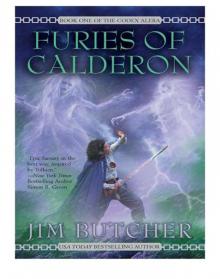 Codex Alera 01 - Furies of Calderon
Codex Alera 01 - Furies of Calderon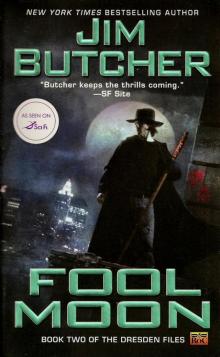 Dresden Files 02 - Fool Moon
Dresden Files 02 - Fool Moon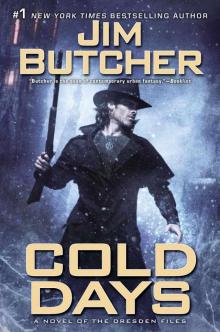 Cold Days: A Novel of the Dresden Files
Cold Days: A Novel of the Dresden Files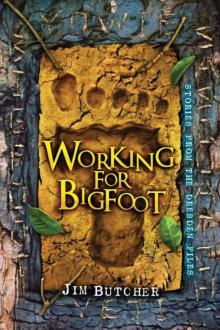 Working for Bigfoot
Working for Bigfoot Side Jobs
Side Jobs Even Hand
Even Hand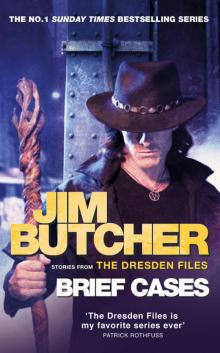 Brief Cases: The Dresden Files
Brief Cases: The Dresden Files Blood Rites: Book Six of the Dresden Files
Blood Rites: Book Six of the Dresden Files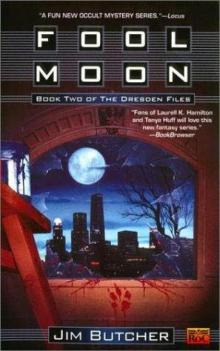 Fool Moon df-2
Fool Moon df-2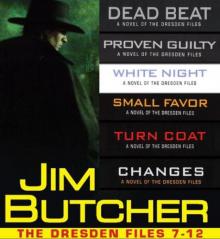 The Dresden Files Collection 7-12
The Dresden Files Collection 7-12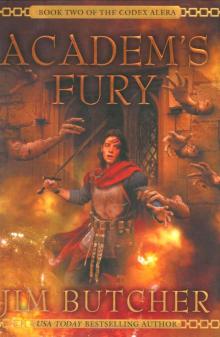 Academ's Fury ca-2
Academ's Fury ca-2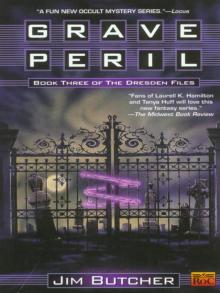 The Dresden Files 3: Grave Peril
The Dresden Files 3: Grave Peril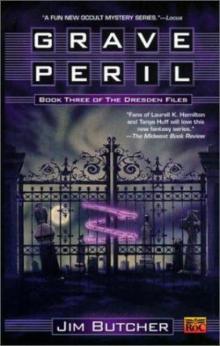 Grave Peril df-3
Grave Peril df-3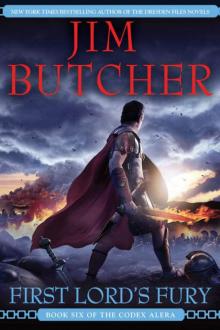 Codex Alera 06 - First Lord's Fury
Codex Alera 06 - First Lord's Fury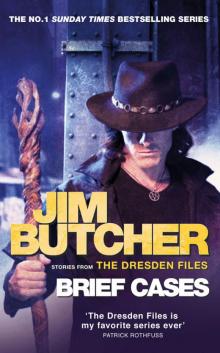 Brief Cases
Brief Cases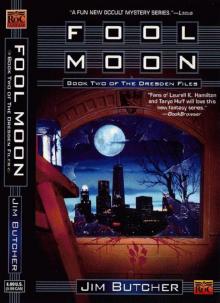 Dresden Files Book 02: Fool Moon
Dresden Files Book 02: Fool Moon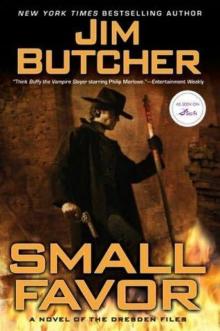 SMALL FAVOR tdf-10
SMALL FAVOR tdf-10 Bigfoot on Campus
Bigfoot on Campus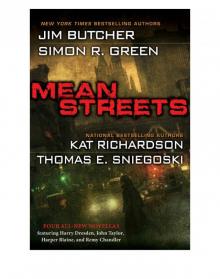 Mean Streets
Mean Streets Dead Beat df-7
Dead Beat df-7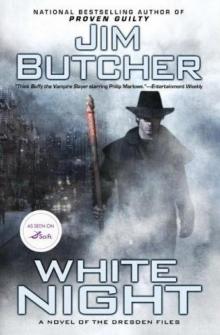 White Night df-9
White Night df-9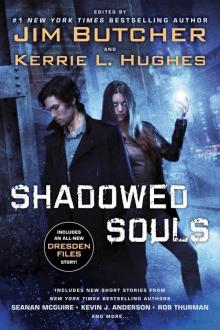 Shadowed Souls
Shadowed Souls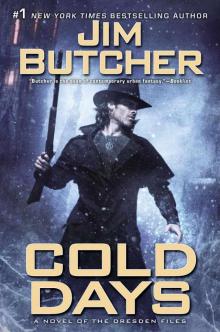 Dresden Files 14 - Cold Days
Dresden Files 14 - Cold Days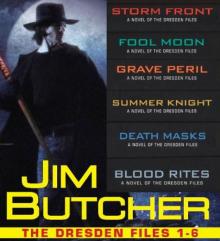 The Dresden Files Collection 1-6
The Dresden Files Collection 1-6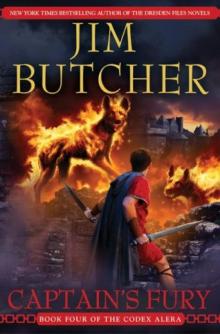 Captain's Fury ca-4
Captain's Fury ca-4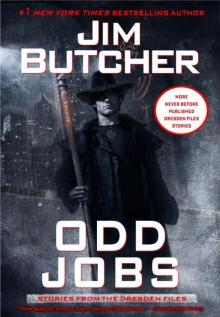 Odd jobs sftdf-2
Odd jobs sftdf-2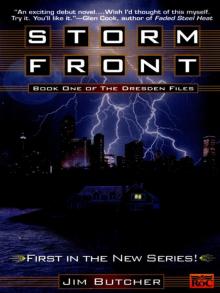 The Dresden Files 1: Storm Front
The Dresden Files 1: Storm Front Blood Rites df-6
Blood Rites df-6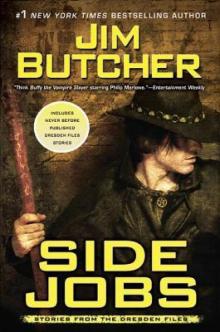 Side Jobs: Stories from the Dresden Files
Side Jobs: Stories from the Dresden Files B is for Bigfoot
B is for Bigfoot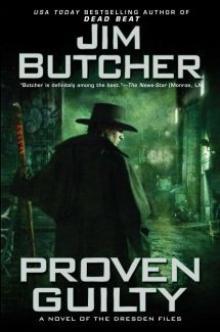 Proven Guilty df-8
Proven Guilty df-8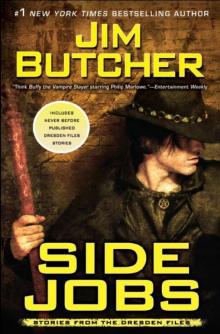 Dresden Files SSC01 - Side Jobs
Dresden Files SSC01 - Side Jobs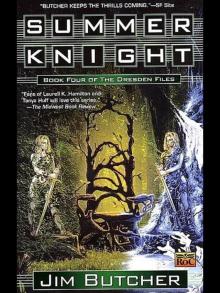 Summer Knight: Book Four of the Dresden Files
Summer Knight: Book Four of the Dresden Files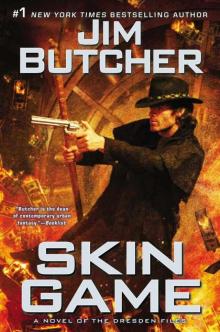 Skin Game: A Novel of the Dresden Files
Skin Game: A Novel of the Dresden Files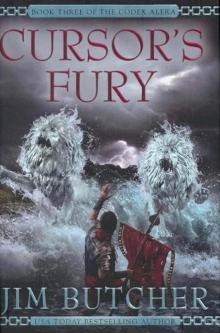 Cursors's Fury ca-3
Cursors's Fury ca-3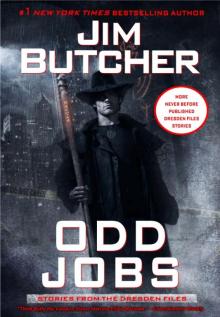 Dresden Files SSC02 - Odd Jobs
Dresden Files SSC02 - Odd Jobs Death Masks df-5
Death Masks df-5 Restoration of Faith (the dresden files)
Restoration of Faith (the dresden files)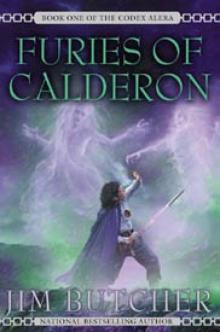 Furies of Calderon ca-1
Furies of Calderon ca-1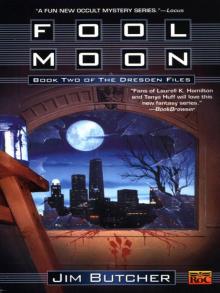 The Dresden Files 2: Fool Moon
The Dresden Files 2: Fool Moon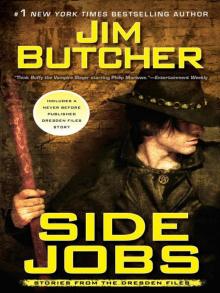 Dresden files:Side jobs (dresden files:short stories)
Dresden files:Side jobs (dresden files:short stories) I Was a Teenage Bigfoot
I Was a Teenage Bigfoot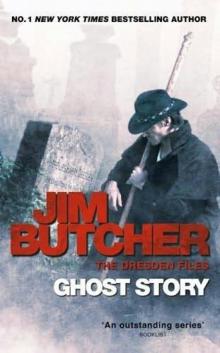 Ghost Story df-13
Ghost Story df-13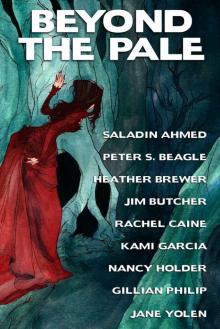 Beyond the Pale: A fantasy anthology
Beyond the Pale: A fantasy anthology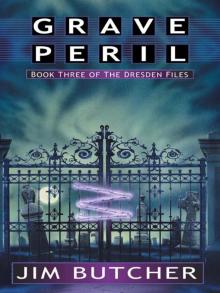 Dresden Files 03 - Grave Peril
Dresden Files 03 - Grave Peril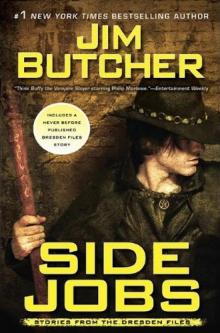 Side Jobs df-13
Side Jobs df-13